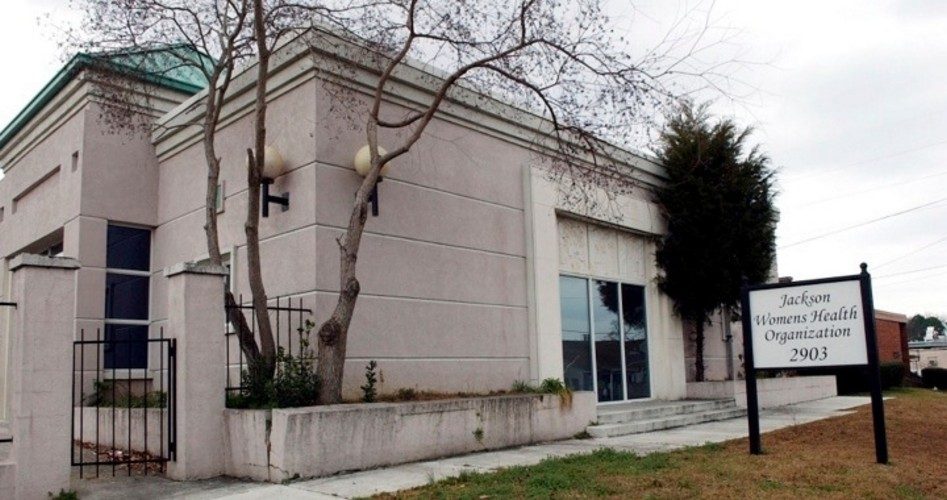
A federal judge has temporarily blocked a state law that would close down Mississippi’s only abortion clinic, meaning that for the time being the clinic can continue to operate. The law requires that anyone performing an abortion in a clinic be a licensed Ob-Gyn medical doctor, with professional privileges allowing them to admit patients to a local hospital. Lack of such a doctor at the Jackson Women’s Health Organization in Jackson, Mississippi, threatened its closure, until the judge stepped in on July 1 to keep the facility open, extending the order on July 12 as he considers a request to allow it to continue operating indefinitely.
The clinic operator sued the state June 27 in an attempt to block the law, passed in April, from being implemented. In approving the extended injunction, Federal Judge Daniel Jordan III wrote that while the law would be able to go into effect, “plaintiffs will not be subject to the risk of criminal or civil penalties at this time or in the future for operating without the relevant privileges.”
The law’s supporters, including Republican Governor Phil Bryant, say it was implemented to protect mothers from unsafe abortion practices. “This legislation is an important step in strengthening abortion regulations and protecting the health and safety of women,” Bryant said in a statement. “As governor, I will continue to work to make Mississippi abortion-free.”
As reported by the wire service Baptist Press News, in his latest ruling, Jordan said that he needed additional time to review new state health department rules for implementing the law. Jordan will then decide whether to issue a preliminary injunction to bar enforcement of the law while a suit filed by the clinic moves forward.
A spokesperson for Planned Parenthood applauded the ruling, saying that it means “a woman in Mississippi will continue to be able to make her own personal health care decisions in consultation with her family, her faith, and her physician — at least for the time being.”
Dana Chisholm, president of Pro-Life Mississippi, said her group was disappointed that Jordan had interfered with implementation of the law. “We have maintained from the beginning that this law is about women’s health, and no organization or person should be allowed to be a danger to women just because they do so in the name of abortions,” Chisholm said. “This is and always has been about protecting women, not about protecting abortionists nor political sacred cows.”
On July 5, shortly after Jordan’s first ruling on the law, Chisholm sent a letter to Planned Parenthood’s state and national office, asking the organization to support the compromise law that would not ban abortion, but merely limit the procedure to being performed by qualified medical professionals under safe conditions. “While our organizations obviously differ on the core issue of abortion,” Chisholm wrote to Planned Parenthood, “one thing we do hold in common is support of women’s health. Similar laws are already in place in 12 other states holding opportunistic doctors accountable for atrocities against women.”
The issue of admitting privileges for hospitals is a key element of the new law, which would also require abortionists to purchase malpractice insurance where currently there is no requirement, a change that would give women injured during an abortion procedure redress against poor healthcare. “On staff OB-GYNs, as required in the law, provide a higher level of service for the women of Mississippi,” Chisholm pointed out in her letter to Planned Parenthood. “Our organizations may end up disagreeing on many other issues, but certainly we can agree that a woman’s health is of paramount importance. Certainly we could agree that the 2,000 plus Mississippi women each year who feel they must make the horrific choice of abortion deserve a higher standard of care.”
The Supreme Court has ruled that states cannot place an undue burden on the abortion process, a charge the owner of the Jackson clinic makes against the Mississippi measure. “They’re out to close us down,” clinic owner Diane Derzis said of state officials, adding that her clinic’s out-of-state abortionists have been unable to obtain admitting privileges.
As reported by the Associated Press, “Admitting privileges can be difficult to get because hospitals might not grant them to out-of-state physicians, or hospitals with religious affiliations might not give them to doctors who perform abortions. When clinic employees called a Catholic hospital to ask about applying for privileges, Derzis said, ‘we were told not to bother.’”
Derzis argued that the clinic would face irreparable harm if the law goes forward because local hospitals have refused to respond in a timely manner to the requests for admitting privileges for clinic doctors. “If they’re denied or if the hospitals are dragging their feet, that’s going to be more clear evidence that there’s a substantial obstacle” to an abortion, Robert McDuff, an attorney for the clinic, argued.
But proponents of the law say it helps protect a woman who has received an abortion by ensuring she has access to quality healthcare if she has to go to the hospital. While the process of getting admitting privileges may be inconvenient, that inconvenience does not equate into “irreparable harm,” proponents insist. “All the state is doing here is to apply a common-sense rule that’s applicable to all ambulatory surgical centers,” said Steven Aden of the Alliance Defense Fund, which is helping the state defend the law.
Baptist Press News noted that various pro-life measures passed by the Mississippi legislature “have helped produce a dramatic reduction in abortions over the last two decades. The state total has dropped from more than 8,000 abortions in 1991 to less than 2,800 in 2010, according to Mississippi Right to Life.”
Photo of Jackson Women’s Health Organization: AP Images



